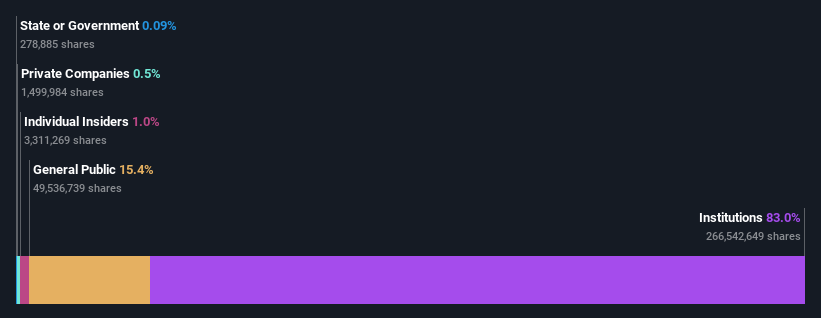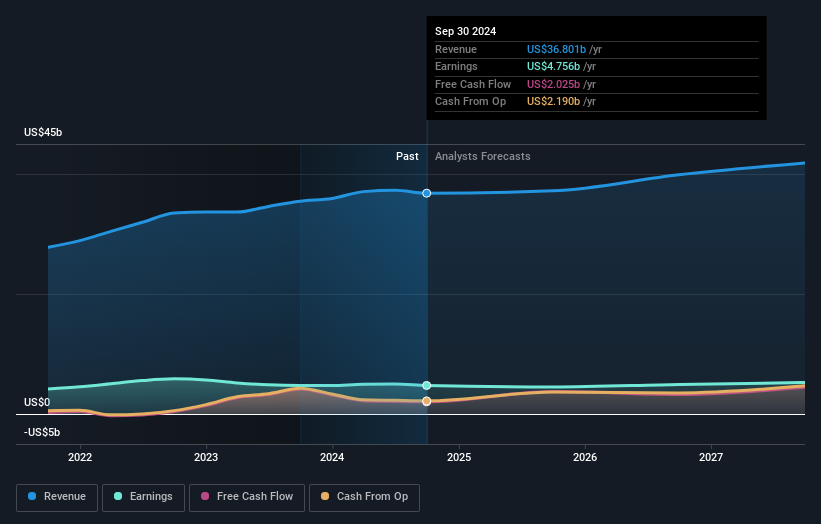- United States
- /
- Consumer Durables
- /
- NYSE:DHI
With 83% ownership of the shares, D.R. Horton, Inc. (NYSE:DHI) is heavily dominated by institutional owners

Key Insights
- Institutions' substantial holdings in D.R. Horton implies that they have significant influence over the company's share price
- The top 17 shareholders own 50% of the company
- Recent sales by insiders
To get a sense of who is truly in control of D.R. Horton, Inc. (NYSE:DHI), it is important to understand the ownership structure of the business. We can see that institutions own the lion's share in the company with 83% ownership. That is, the group stands to benefit the most if the stock rises (or lose the most if there is a downturn).
Since institutional have access to huge amounts of capital, their market moves tend to receive a lot of scrutiny by retail or individual investors. Therefore, a good portion of institutional money invested in the company is usually a huge vote of confidence on its future.
Let's delve deeper into each type of owner of D.R. Horton, beginning with the chart below.
View our latest analysis for D.R. Horton

What Does The Institutional Ownership Tell Us About D.R. Horton?
Many institutions measure their performance against an index that approximates the local market. So they usually pay more attention to companies that are included in major indices.
D.R. Horton already has institutions on the share registry. Indeed, they own a respectable stake in the company. This can indicate that the company has a certain degree of credibility in the investment community. However, it is best to be wary of relying on the supposed validation that comes with institutional investors. They too, get it wrong sometimes. It is not uncommon to see a big share price drop if two large institutional investors try to sell out of a stock at the same time. So it is worth checking the past earnings trajectory of D.R. Horton, (below). Of course, keep in mind that there are other factors to consider, too.

Investors should note that institutions actually own more than half the company, so they can collectively wield significant power. D.R. Horton is not owned by hedge funds. Our data shows that The Vanguard Group, Inc. is the largest shareholder with 11% of shares outstanding. Meanwhile, the second and third largest shareholders, hold 9.6% and 6.5%, of the shares outstanding, respectively.
Looking at the shareholder registry, we can see that 50% of the ownership is controlled by the top 17 shareholders, meaning that no single shareholder has a majority interest in the ownership.
While studying institutional ownership for a company can add value to your research, it is also a good practice to research analyst recommendations to get a deeper understand of a stock's expected performance. Quite a few analysts cover the stock, so you could look into forecast growth quite easily.
Insider Ownership Of D.R. Horton
The definition of company insiders can be subjective and does vary between jurisdictions. Our data reflects individual insiders, capturing board members at the very least. The company management answer to the board and the latter should represent the interests of shareholders. Notably, sometimes top-level managers are on the board themselves.
I generally consider insider ownership to be a good thing. However, on some occasions it makes it more difficult for other shareholders to hold the board accountable for decisions.
We can report that insiders do own shares in D.R. Horton, Inc.. The insiders have a meaningful stake worth US$468m. Most would say this shows a good alignment of interests between shareholders and the board. Still, it might be worth checking if those insiders have been selling.
General Public Ownership
The general public, who are usually individual investors, hold a 15% stake in D.R. Horton. While this size of ownership may not be enough to sway a policy decision in their favour, they can still make a collective impact on company policies.
Next Steps:
It's always worth thinking about the different groups who own shares in a company. But to understand D.R. Horton better, we need to consider many other factors.
I like to dive deeper into how a company has performed in the past. You can access this interactive graph of past earnings, revenue and cash flow, for free.
But ultimately it is the future, not the past, that will determine how well the owners of this business will do. Therefore we think it advisable to take a look at this free report showing whether analysts are predicting a brighter future.
NB: Figures in this article are calculated using data from the last twelve months, which refer to the 12-month period ending on the last date of the month the financial statement is dated. This may not be consistent with full year annual report figures.
New: Manage All Your Stock Portfolios in One Place
We've created the ultimate portfolio companion for stock investors, and it's free.
• Connect an unlimited number of Portfolios and see your total in one currency
• Be alerted to new Warning Signs or Risks via email or mobile
• Track the Fair Value of your stocks
Have feedback on this article? Concerned about the content? Get in touch with us directly. Alternatively, email editorial-team (at) simplywallst.com.
This article by Simply Wall St is general in nature. We provide commentary based on historical data and analyst forecasts only using an unbiased methodology and our articles are not intended to be financial advice. It does not constitute a recommendation to buy or sell any stock, and does not take account of your objectives, or your financial situation. We aim to bring you long-term focused analysis driven by fundamental data. Note that our analysis may not factor in the latest price-sensitive company announcements or qualitative material. Simply Wall St has no position in any stocks mentioned.
About NYSE:DHI
D.R. Horton
Operates as a homebuilding company in East, North, Southeast, South Central, Southwest, and Northwest regions in the United States.
Undervalued with excellent balance sheet and pays a dividend.
Similar Companies
Market Insights
Community Narratives



